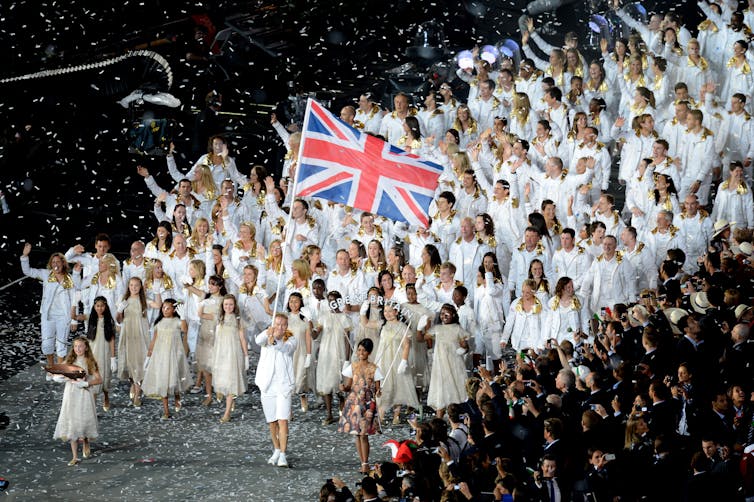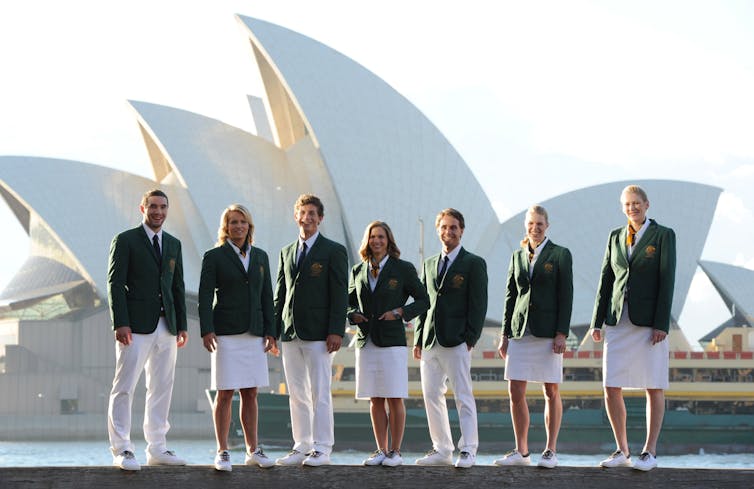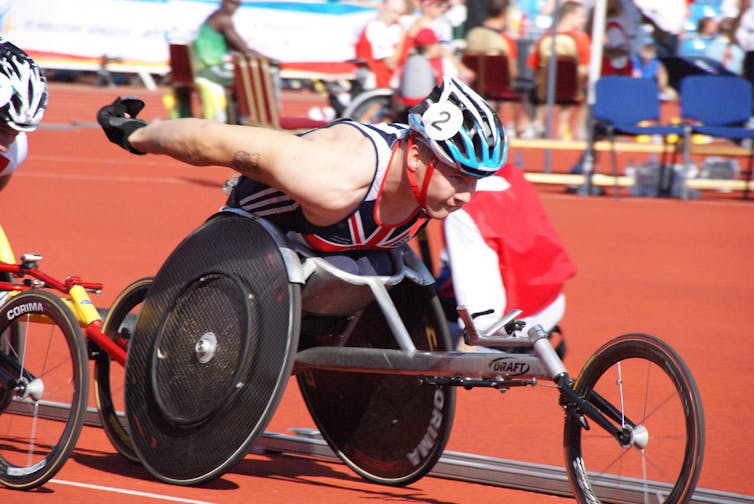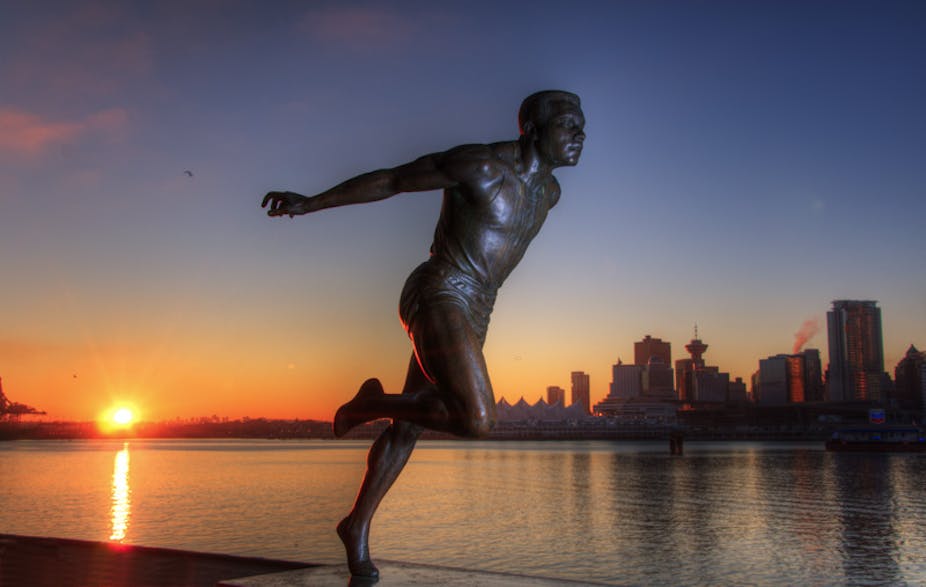The London Olympics and Paralympics have arrived at the perfect time. It’s almost like we need a good dose of sporting inspiration, courage and positivity to help get us back on track.
Despite being a nation of people who are supposedly wealthier, healthier and more informed than ever, our Aussie “comfortable and relaxed” meter is at a very low ebb. Recent Essential Media Communications research has confirmed this, suggesting Australia is a pretty miserable place right now.
At the heart of our concerns is the community’s lack of faith in the integrity of just about every major institution in our society at the moment: our governments (and oppositions), our banks, the media, the church, and so on.
It’s at times like this we tend to look to our sporting teams and sportspeople to add meaning and richness to our lives, to provide something that represents us, something larger than us that can shine through self-serving spin and agendas and act as a beacon of virtue and integrity. Cue the greatest sporting spectacle on earth.
The issue of maintaining the integrity of sport was addressed at the higher echelons several weeks ago in London at the sixth Commonwealth Sport Ministers meeting. At the meeting, the ministers agreed to a set of principles to combat the potential threats of match fixing and illegal sports betting.
Following the meeting, our own federal sports minister Kate Lundy said:
“All spectators and participants deserve to have confidence that the sport they love is free from corruption and they should take confidence in the determination of Commonwealth member nations to maintain the integrity of sport and work cooperatively”.

As we revel in the achievements (and disappointments) of London 2012, it’s important we remember that a winner is not always judged on how many medals they win. The best athletes are always the ones who are good sports and compete with honour and integrity.
With a long rich history, Olympic and Paralympic Games have certainly produced some moments of great sportsmanship. Following are a few examples which demonstrate there are more important things in life than winning.
At the 1932 Los Angeles Olympic Games, British fencer Judy Guinness had the gold medal in the bag when she informed officials that her Austrian opponent, Ellen Preis, had touched her twice. The hits would have gone undetected and Guinness would have won. Instead she relinquished the win and took the silver medal.
At the 1988 Olympic Games in Seoul, Korea, Canadian sailor Lawrence Lemieux was racing alone near the halfway point in his Finn class race. He was in second place in a seven-race event when he spotted two Singapore sailors in the water who were both injured and unable to right their boat.
Lemieux broke away and sailed to rescue them, waited for an official patrol boat and then transferred the two sailors. He continued his race and finished in 22nd place. After the race the International Yacht Racing Union jury awarded him second place – his position when he went to the aid of the capsized crew.

Also at the Seoul Olympics, no-one knew much about Aussie kayaker Grant Davies before he competed in the 1,000m K-1 final. He’d just scraped through his heat and semi by finishing in third place and took the last qualifying spot in each. But in the main event he caused a boil-over by beating American favourite, multiple world champion and Olympic gold medallist Greg Barton.
Just as he was about to accept the gold medal, officials told Davies he had actually lost by five one-thousands of a second to Barton. In response to the news of the heart-breaking loss, he casually responded:
“If this is the worst thing to happen to me, I will have a pretty good life”.
The Australian Olympic Federation later awarded Davies a special sportsmanship medal to recognise his gracious adherence to the Olympic spirit. He remains the only person to have ever received this medal.
At the 2008 Paralympic Games in Beijing, the UK’s David Weir won the gold medal in the men’s 800m T54 wheelchair race ahead of Australia’s Kurt Fearnley. Following the race, the International Paralympic Committee (IPC) ordered a re-run after discovering a lane violation.
Fearnley and the Australian authorities wrote to the IPC asking that, in the spirit of sportsmanship, the re-run be cancelled and the medals re-instated. “I just thought that at the end of the day a race was run”, Fearnley said. “It may not have been the race that was supposed to happen but it happened and the best man won”.
Fearnley and Weir will again race in London.

Now don’t get me wrong. I’m not so sports-obsessed that I’m oblivious to sports’ and sportspeople’s capacity to be flawed, self-deceptive and corrupt. Despite striving for perfect standards of fair play, sport often disappoints and falls well short.
In recent years, many integrity and ethical concerns have arisen, including issues related to racism and vilification, violence on and off the field, doping and drug use, sexual assault, betting and match-fixing, homophobia and gender-based discrimination, and unethical coaching practices, just to name a few.
Stories of an Albanian weightlifter being sent home from these Olympics after testing positive to a banned steroid, an Uzbekistan gymnast being suspended for failing a drug test, Italy’s defending Olympic 50km walk champion admitting to doping, and a Greek athlete and Swiss football player being banned for racist Twitter comments, do not help sports’ reputation any.
But despite its failings, sport is generally considered to be one of the most powerful ways to influence individuals and communities in a positive way. There is proven research on the positive, character-building power of sport and its ability to create social bridges and break down cultural barriers in a unique way that other areas of society simply cannot.
In these current “troubled” times, buoyed on by the hysteria around the London Games, sport has a real opportunity to reaffirm itself in our national consciousness, as an institution which lifts us by reconnecting people with values that we like to define us – honesty, decency, humility and integrity.
With the recriminations and finger-pointing already starting about Australia’s “silver” performance at these Games, a few more traits which we also like to identify ourselves with – such as toughness, resilience and mateship – will need to be demonstrated in the near future.
As Donald Horne wrote in the classic book The Lucky Country:
“To play sport, or watch others play, and to read and talk about it is to uphold the nation and build its character”.
And when you live in a country where any of our AFL clubs have a greater membership than any of our political parties, the significance and power of sport to shape our national identity is hard to underestimate.

